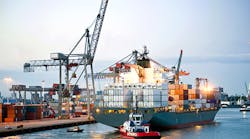Barely a day goes by that I do not receive one or more misguided email messages from some manufacturer overseas seeking to be my source for valves, or welding wire, or some other bulk product I do not need. It’s the global supply chain demonstrating the low-probability strategy known as “cold calling.” I doubt there is much profit in this approach, but that’s free trade, I suppose. Buying goods produced off-shore was once the cause of much anxiety among domestic manufacturers, many of whom would quickly call it unfair trade, making little or no distinction between free and fair.
Some time had passed since last I followed the subject of “reshoring” — the initiative to encourage businesses to give first preference to domestic suppliers in their supply-chain sourcing decisions. That means buyers of castings (or other manufactured goods) should recognize the advantages of choosing domestic foundries or diecasters as suppliers, rather than engage an offshore provider. The Reshoring Initiative is a non-profit group that deserves credit for defining and promoting the concept, in particular by developing a formula (the Total Cost of Ownership Estimator®) that helps buyers and suppliers see the comparative costs (e.g., inventory carrying costs, shipping expenses, intellectual property risks) of sourcing manufactured parts from offshore.
Recently the group delivered a summary report of conditions on this subject, through 2015, and announced that the combined effect of reshoring and new, foreign-direct investment (or FDI, the term for companies establishing manufacturing capacity in the U.S.) resulted in 67,000 jobs last year. Since 2010 (the peak for off-shoring anxiety) the two factors have resulted in more than 249,000 domestic jobs, according to TRI. In fact, the 2015 results show the effects slowing, which it attributed to a strong U.S. currency (which made foreign-produced goods cheaper to buy), low fuel prices and shipping rates (which cut delivery costs), and a weak global economy (which diminished demand for goods overall, and made foreign suppliers more determined to reduce prices.)
I have never been an advocate of preferential purchasing, so I have credited TRI with giving a new economic rationale to that side of the debate over global trade. Too much of that discussion is based on emotional appeals to support less competitive businesses, or biased objections to “foreign” goods. I can appreciate some efforts to penalize “dumped” products, or to isolate nations that violate international law or the standards of human decency. Those measures, after all, are designed to punish violators rather than reward underperformers.
TRI does not shy from its objective of strengthening the domestic manufacturing sector, and while it contends that the rapid rate of job loss to off-shoring decisions has been blunted since 2010, it still acknowledges challenges to recovering 3-4 million manufacturing jobs lost by those decisions.
We should credit TRI and those manufacturers who are reshoring their supply-chain decisions with advancing the general understanding about global trade — that is, that investors and decision-makers should pursue their local options to maximize value — but the overriding fact is that in recent years a series of market factors have shifted in favor of domestic manufacturers. That is, the free market worked, in many cases because domestic manufacturers improved their competitive standing. Job losses or job creation are a measure of economic competitiveness and the decisions of buyers, not because some policy grand policy shift. Rather, policies and regulations typically inhibit manufacturing growth.
The inclination to equate job-creation with economic progress is misguided, too. It promotes that revived brand of mercantilism we’ve seen perfected by the world’s worst trade violators, nations that shift and adjust their policies according to their own determination to accumulate wealth and intimidate the rest of the world. In those places, employment becomes a measure of maximizing resources, not of encouraging individual potential.
We should prefer a new adaptation of global free trade, by which the benefits of economic growth are enjoyed first by the buyers and investors, whose ingenuity can accelerate prosperity, and outpace the machinations of those who would manage trade for their own influence.









